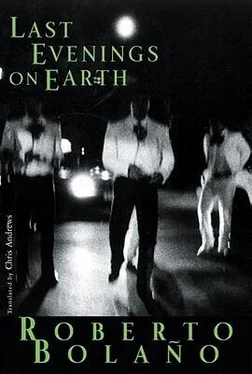Then his father walks toward the door stooping slightly and B stands aside to give him room to move. Tomorrow we'll leave, tomorrow we'll go back to Mexico City, thinks B joyfully. And then the fight begins.
One day B goes to a party organized by a group of Chileans exiled in Europe. B has recently arrived from Mexico and knows very few of the people there. He is surprised to discover that it is a family gathering: the guests are united by blood ties as well as ties of friendship. Brothers dance with cousins, aunts with nephews, and wine flows in abundance.
At one point, possibly at dawn, a young man starts quarreling with B on some pretext or other. The argument is regrettable and predictable. The young man, U, shows off his crackpot erudition: he confuses Marx with Feuerbach, Che Guevara with Frantz Fanуn, Rodу with Mariбtegui and Mariбtegui with Gramsci. It is not a good time to start an argument, to say the least: in Barcelona the light of dawn can drive people mad if they've been up all night, or turn them cold and hard like executioners. That's not my idea; that's what B thinks, and consequently his replies are icy and sarcastic, more than enough provocation for U, who is positively spoiling for a fight. But when the fight seems imminent, B stands up and refuses to have it out. U insults and challenges him, hits the table (or maybe the wall) with his fist. All in vain.
B ignores him and leaves.
The story could end there. B hates the Chilean exiles who live in Barcelona, although he is one of them and there's not a thing he can do about it. The poorest and probably the loneliest of them all. Or so he believes. The way he remembers the incident, it was really like a schoolyard confrontation. But Us violence bitterly disappoints B, because U was and possibly still is an active member of the left-wing party to which he himself, at this point in his life, is most sympathetic. Once again reality has proven that no particular group has a monopoly over demagogy, dogmatism, and ignorance.
But B forgets the incident, or tries to, and gets on with his life.
Periodically B hears U mentioned, in a vague sort of way, as if he were dead. B would really prefer not to know, but when you regularly see certain people, you can't avoid hearing what has happened in their circle of friends, or what they think has happened. In this way, B discovers that U has become a Spanish citizen or that U was seen with his wife at a concert given by a Chilean folk group. For a moment, B even imagines U and U's wife sitting in a theater as it gradually fills with people, waiting for the curtain to rise, revealing the folk musicians, guys with long hair and beards, more or less like U, and he imagines U's wife, whom he has seen only once and remembers as beautiful but with something odd about her, a woman who is absent, elsewhere, who says hello (as she said hello to B at that party) from elsewhere; he imagines her looking at the curtain, which still hasn't been raised, and looking at her husband from elsewhere, from a shapeless place dimly visible in her large, calm eyes. But how, wonders B, could that woman possibly have calm eyes? There is no answer.
One night, however, an answer presents itself, though it is not the answer that B was expecting. Over dinner with a Chilean couple, B discovers that U has been committed to a psychiatric hospital after having tried to kill his wife.
Perhaps B has had too much to drink that night. Perhaps the Chilean couple's version of the events is grossly exaggerated. In any case B listens to the story of U's misfortunes with considerable pleasure, which imperceptibly gives way to a feeling of triumph, an irrational, small-minded triumph, hailed by all the shadows of his bitterness and disenchantment. He pictures U running down a vaguely Chilean, vaguely Latin American street, howling or shouting, while smoke begins to emerge from the buildings on either side, steadily, although at no point can any flames be seen.
From then on, whenever B sees the Chilean couple, he makes a point of asking about U and that is how he discovers, little by little, as if the news were being served up to him once a fortnight or once a month for his secret delectation, that U has left the psychiatric hospital, that U is out of work, that U's wife has not left him (which strikes B as truly heroic on her part), that sometimes U and his wife talk about returning to Chile. Naturally the Chilean couple find the idea of returning to Chile attractive. B finds it horrific. But wasn't U a revolutionary? he asks. Wasn't U a member of the MIR?
Although he doesn't say so, B feels sorry for U's wife. How could a woman like her fall in love with a guy like that? At some point B even imagines them making love. U is tall and blond and his arms are strong. If we had fought that night, he thinks, I would have lost. U's wife is slim; she has narrow hips and black hair. What color are her eyes? B wonders. Green. Very pretty eyes. Sometimes it infuriates B to think of U and his wife, and if only he could, he would forget them forever (after all, he has only seen them once!), but the image of the couple against the background of that awful party has a mysterious purchase on his memory, as if it held some meaning for him, an important meaning, but one that B, though he keeps coming back to it, cannot decipher.
One night as B is walking down the Ramblas, he happens to run into his Chilean friends. They are with U and his wife. U's wife smiles and greets him in what could be described as an effusive manner. U, by contrast, barely says a word to him. For a moment B thinks that U is pretending to be shy or distracted. Yet nothing in his behavior indicates the slightest hostility. In fact, it is as if U were seeing him for the first time. Is it an act? Is this disinterest natural or a result of the psychotic episode? U's wife talks about a book she has just bought at one of the newsstands in the Ramblas, as if she were trying to attract B's attention. She takes out the book, shows it to him, and asks what he thinks of the author. B is obliged to confess that he has not read the author in question. You have to, says U's wife, adding: If you like, when I finish it, I'll lend it to you. B doesn't know what to say. He shrugs his shoulders. He mumbles a noncommittal yes.
When they say good-bye, U's wife kisses him on the cheek. U gives him a firm handshake. See you soon, he says.
When they are gone, it strikes B that U is not as tall nor as strong as he remembered from the party; in fact he is only slightly taller than B. His wife, by contrast, has grown and taken on a singular radiance in B's imagination. For reasons unrelated to this encounter, B has trouble getting to sleep that night and at some point his insomniac ruminations return to U.
He imagines U in the Saint Boi psychiatric hospital; he sees him tied to a chair, writhing in fury while doctors (or the shadows of doctors) attach electrodes to his head. Maybe that sort of treatment can make a tall person shorter, he thinks. It all seems absurd. Before falling asleep he realizes that he has settled his score with U.
But that is not the end of the story.
And B knows it. He also knows that the story of his relationship with U is not the story of a banal grudge.
The days go by. At first, impelled by a somewhat self-destructive urge, B tries to find U and his wife, and to that end he starts visiting the Chilean exiles he knows in Barcelona far more assiduously than before, and he listens to their problems and commentaries on daily life with a mixture of horror and indifference. But U and his wife are never there; no one has seen them, although everyone, of course, has an anecdote to recount or an opinion about their dreadful situation, which can only get worse. After a string of such visits and monologues, B is obliged to conclude that U and his wife are avoiding the company of their compatriots. B's urge to see them wanes and dies, and he goes back to his old ways.
Читать дальше












